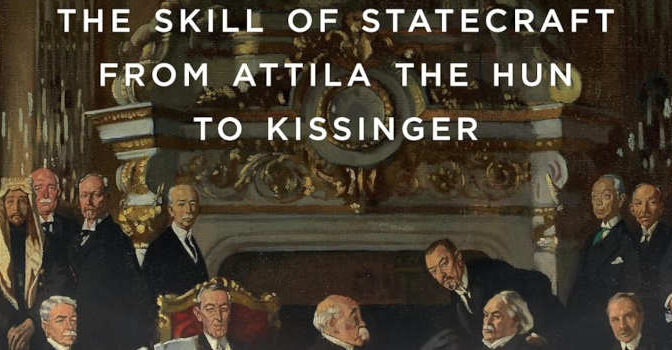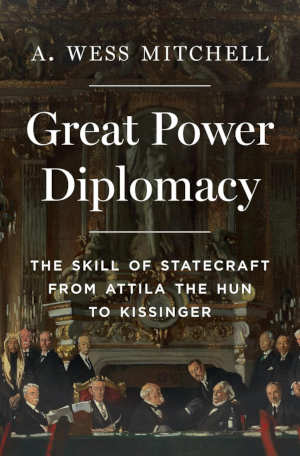A. Wess Mitchell Great Power Diplomacy review, recensie en informatie boek over de vaardigheid van staatsmanschap en diplomatie van Attila de Hun tot Kissinger. Op 14 oktober 2025 verschijnt bij Princeton University Press het boek over de rol van diplomatie, geschreven door A. Wess Mitchell, de Amerikaanse historicus en voormalig diplomaat. Er is geen Nederlandse vertaling van het boek verkrijgbaar.
A. Wess Mitchell Great Power Diplomacy review en recensie
- “Wess Mitchell’s book continues his fine tradition of writing perceptively and realistically about the confluence of history, diplomacy, and geopolitics.” (Robert D. Kaplan)
- “Great Power Diplomacy is an indictment, understated but devastating, of the utopian foreign policy pursued by the United States and its allies in the post–Cold War world; an eloquent summons to the study of grand strategy and political, cultural, economic, military, and diplomatic history; and a clarion call for a return to old-fashioned diplomacy aimed at securing the survival and prosperity of one’s own political community. This book is a must-read for those in our foreign policy establishment, and it ought to be on the bedside table of the president of every American college or university that gives short shrift to political, cultural, economic, military and diplomatic history.” (Paul A. Rahe, author of The Grand Strategy of Classical Sparta: The Persian Challenge)
- “As powers contend with the consequences of today’s era of geopolitical rivalry and face an increasingly dangerous world, Mitchell offers a thoughtful account of the role diplomacy has played across centuries defined by periods of sharper competition. Those seeking insights into the importance of diplomacy in our new era will find much to appreciate in this timely and well-crafted book.” (Walter Russell Mead, author of Special Providence: American Foreign Policy and How It Changed the World)
Great Power Diplomacy
The Skill of Statecraft from Attila the Hun to Kissinger
- Auteur: A. Wess Mitchell (Verenigde Staten)
- Soort boek: over de diplomatie
- Taal: Engels
- Uitgever: Princeton University Press
- Verschijnt: 14 oktober 2025
- Omvang; 352 pagina’s
- Uitgave: gebonden boek / ebook
- Prijs: $ 35,00
- Boek bestellen bij: Amazon / Bol
Flaptekst boek over de rol van diplomatie van A. Wess Mitchell
A captivating history of diplomacy—and an urgent reminder of why we need to revive its lost arts to survive in a dangerous era of great power competition.
From the beginning of time, human societies have found themselves confronted by enemies too numerous or ferocious to defeat solely by force of arms. In these dramatic moments, wise leaders have turned to diplomacy to rearrange the gameboard in their favor and stymie seemingly unstoppable foes. In Great Power Diplomacy, American historian and diplomat A. Wess Mitchell recounts the forgotten story of how history’s most legendary empires have used diplomacy as a tool of grand strategy to outwit, outmaneuver, and outlast militarily superior opponents.
Through fifteen centuries of history, Great Power Diplomacy recreates the perilous junctures, colorful personalities, and intricate statecraft that led to some of history’s most stunning diplomatic achievements—and greatest disasters. The protagonists include giants like Richelieu, Metternich, Bismarck, and Kissinger, but also a lesser-known cast of scoundrels, eunuchs, drunkards, and fools. At every turn, fortune favored those great powers with the foresight and dexterity to build winning alliances, splinter enemy coalitions, and, when necessary, make peace with their bitterest foes.
Diplomacy of this kind has become a lost art in recent years as Western elites embraced the illusion that globalization and the spread of democracy would create a borderless world where nations would live in harmony and war would be abolished from the human story. But, as Great Power Diplomacy reveals, we will need to rediscover the secrets of skillful statecraft as the world enters an unstable new era in which continent-sized great powers compete for territory, resources, and prestige. By recalling diplomacy’s rich past, we can equip ourselves for a more dangerous future.

